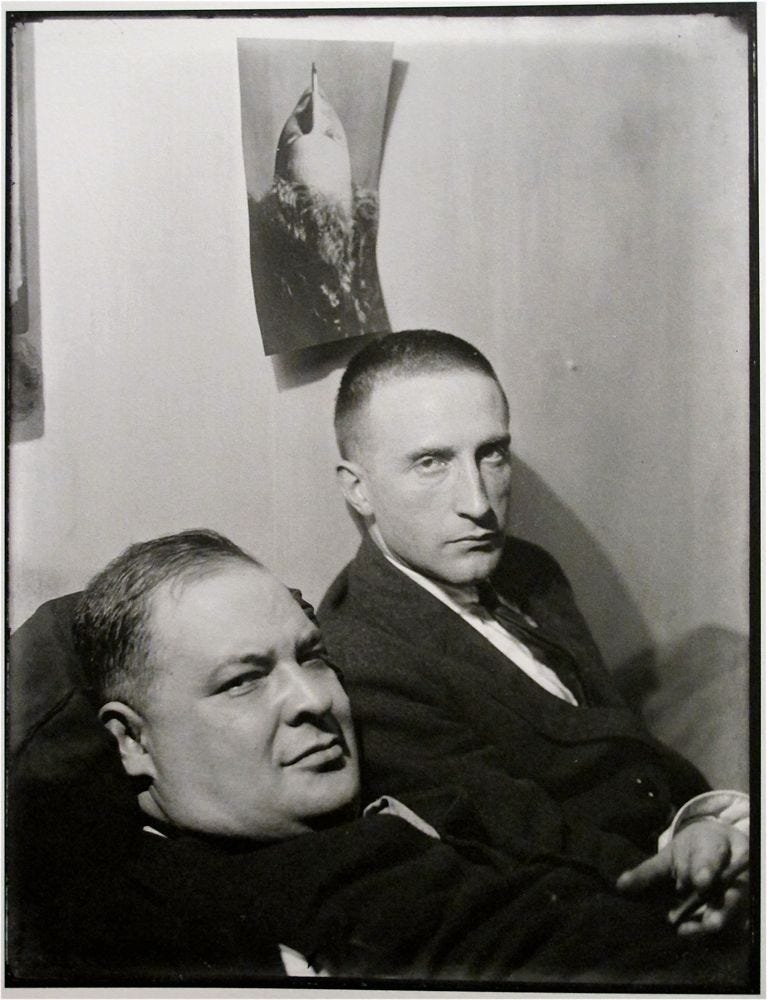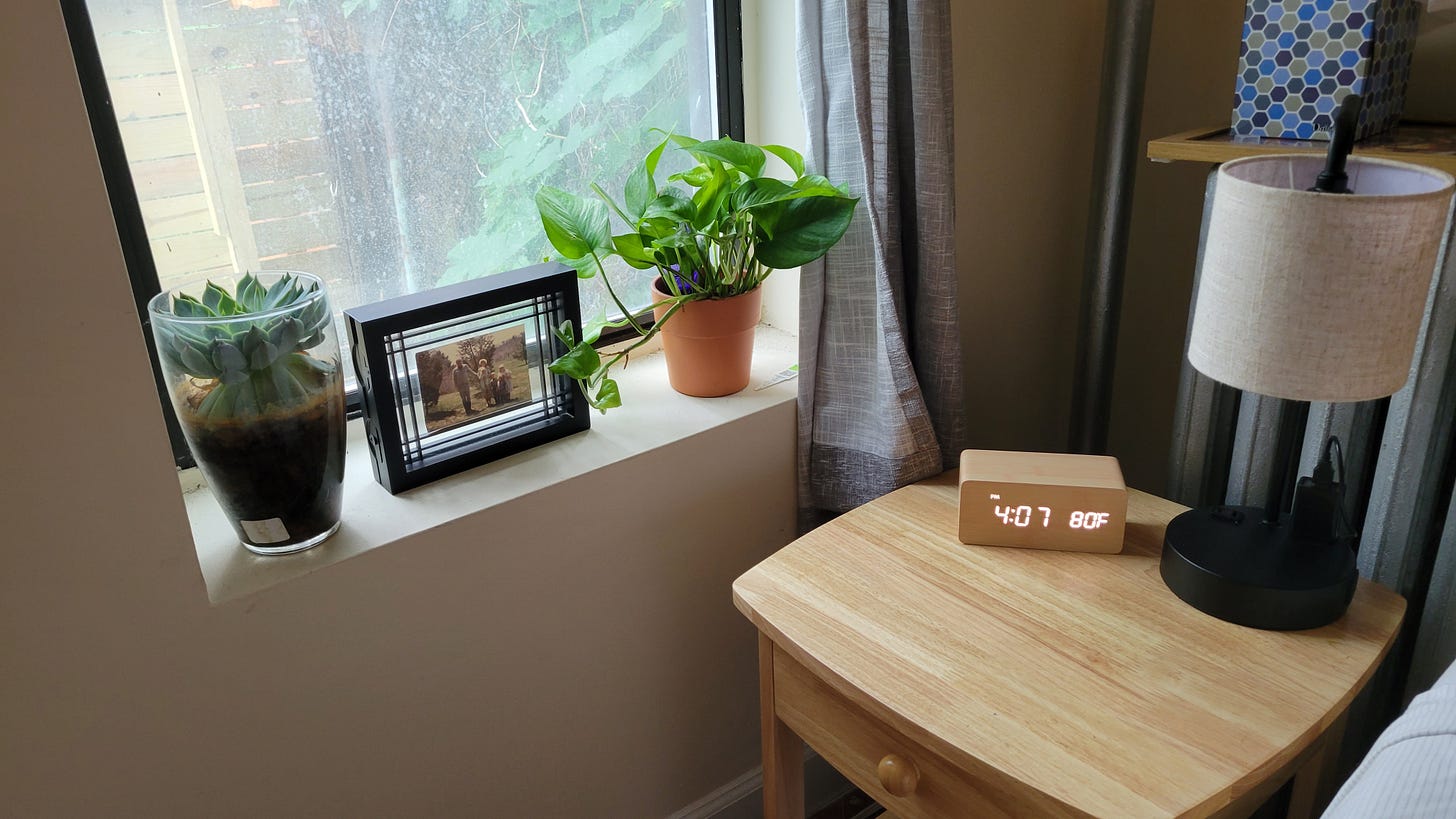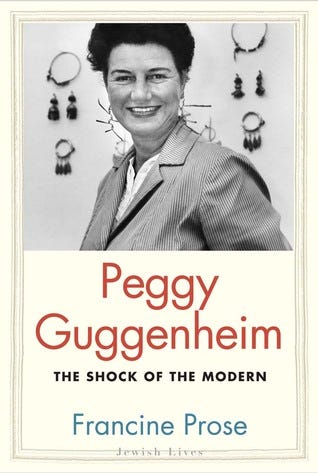OK, back to our regularly scheduled Weekly Digest programming; sorry last week’s was so slight. I’ve been dealing with some depression, but I’m feeling fine the past couple days. It’s too hot in Brooklyn, my mail has not been forwarded from the last address and appears to have disappeared into the maw of the New York USPS, and my cat keeps scratching our new couch, but otherwise day-to-day life is quite lovely and I feel very fortunate. A little less than three weeks after move-in day, our apartment is really an apartment and everything has found its place, save for hanging a couple paintings. Check out my side-of-the-bed zone, which I enjoy for its minimalism.
Eun Hae’s side is messier, but she makes my life much less messy in both literal and figurative ways, so I’m in no position to criticize.
I enjoyed doing this podcast on education run by two teachers. Think the editing could do with a little tweaking but the conversation was lively and interesting and I dig their project. It’s called Learning Machine, check it out. I also did an episode of the podcast Fucking Cancelled and had a lot of fun. I’ll share it with you when it’s out.
This Week’s Posts
Monday, July 19th, 2021 - Didn’t Have to Be This Way: the Jia Tolentino Story
Here I talk about Jia Tolentino and my disappointment about where her career is gone specifically, and the bad incentives and toxic culture of writing in general. As I say here, there’s a lack of ambition that is an offshoot of a bigger problem, which is that writers have been trained in the past couple decades to see writing as something fairly ridiculous to do and to avoid appearing to be pretentious at all costs, which has led to immense amounts of uninspired and boring writing, written in fear.
Wednesday, July 21st, 2021 - Do Liberals Have a Plan Other Than Whining About White People and the Senate?
I feel that, though they complain constantly about the rules being bent against them, liberal Democrats are pretty clearly winning, but also that they lack any sort of larger-scale perspective on what they want the country to be and how to expand their movement to make a more ambitious agenda possible.
Thursday, July 22nd, 2021 - Please Don’t Let Political Contrarianism Turn You Into a Lunatic
I regret using the term lunatic, which is an artifact of this piece being written and published more quickly than usual, without the usual investment of time to edit and review and ruminate. But my point is sound, I think. As a frequent critic of social justice politics, I am keenly aware of the temptation to become fixated on that to a degree that overwhelms what I’m for. I think that’s a mistake - including for being an effective opponent of what you’re opposed to.
Friday, July 23rd, 2021 - my bus ride (subscribers only)
I rescued a celebrated piece from my old archives, about a long trip on a Greyhound bus that shook me and made me ask questions about human cruelty and kindness.
Also this week, I unleased the first two chapters of my serialized novel The Red, the Brown, the Green. Really glad there’s been a few readers, it’s exciting to finally share this story. Go to your settings to sign up for its emails if you would like.
From the Archives
About four years ago I enjoyed writing about Nicaraguan Sign Language, Noam Chomsky, and the poverty of the stimulus. Nicaraguan sign is one of the most-cited examples of the emergent property of language, the notion that it must be embedded very deeply into our brains (and thus our genes). In a very short span severely linguistically deprived children, many of them suffering from other cognitive and developmental disabilities and almost all of them from deprived backgrounds, spontaneously generated a functioning human grammar - and grammars are such spectacularly complex things that we arguably have never fully mapped one. “The poverty of the stimulus” emerges from Chomsky’s famous critique of behaviorist explanations for language: if you look at the amount of language that a child is exposed to prior to beginning to speak, you can’t possibly account for the vast diversity of constructions they are capable of at a very early age. This would seem to undercut the idea that children develop language through a process of imitation and reward.
Amusingly, one of the reactions I got to that piece was from a professor in some avenue of psychology, and he was shocked - he told me that in his field it’s considered completely settled that children do learn language through behaviorist principles. All of their work on language stems from that assumption. I’m certainly not in a position to adjudicate this debate, but I found it remarkable not only that he disagreed with Chomsky’s position but also that he had apparently never heard of it. Remarkable because Chomsky’s review of Skinner is central to the origin story of modern linguistics, to the point of sometimes being invoked as setting its boundary, and is certainly a turning point in the development of contemporary investigation of syntax. I guess it just goes to show how siloed we can all be in our little intellectual worlds.
Song of the Week
Substack of the Week
Gideon’s Substack, by Noah Millman
I recently mentioned the American Scene and the writers I discovered there. Noah Millman is one I’ve followed with interest ever since. Noah is one of very few writers who I’ve read for a long time who I would not try to place on the political spectrum; he’s just too idiosyncratic and motivated by unusual topics and concerns. He’s a producer who’s made some movies with very big-deal people, a theater nut who’s involved in putting on productions in that world as well, he writes a column on politics and news for the Week, and I believe that he was once some finance whiz. He’s also an observant Jew and frequent chronicler of what that means in contemporary times. All of this results in the thing I crave most in writers these days, which is to be surprised, to hear things that I haven’t heard before and read things that I wasn’t expecting to read. It’s just such a conformist world of writing for public consumption out there right now. This results in feeling relieved when I read weird stuff like Noah’s; it’s precisely Noah’s unorthodox set of skills, experiences, and ideas that makes his postmortem on the NYC Democratic primaries more interesting than the vast majority of those out there. He’s well worth reading. Check it out.
Book Recommendation
Peggy Guggenheim: the Shock of the Modern, Francine Prose, 2015
I have previously noted in this space that my biggest living inspiration in nonfiction writing is Francine Prose. (She writes fiction too.) So much of what she does right is evident in this brief biography of the great sponsor of modern art Peggy Guggenheim, part of Yale UP’s Jewish Lives series. It’s sharp, witty, concise while being detailed, frequently funny, and deeply compassionate to Guggenheim without ever being blind to her faults and her many self-inflicted wounds. Guggenheim, inspired in part by competition with her uncle Sol (the namesake of the Guggenheim museum in New York), personally subsidized the work and lives of many of the most famous visual artists of the early 20th century, including her great confidante Marcel Duchamp, her lover Max Ernst, and her foil Jackson Pollock. She was a pivotal figure in defining what we think of when we say “modern art” and led a life that at times was very glamorous. She was also often a wreck, consumed with insecurity, convinced that people only loved her for her money, and constantly falling into affairs with men who inevitably hurt her.
This book will make you feel profound sympathy for Peggy, even as you recognize that she was the kind of person who constantly fell into patterns that harmed her again and again, seeming to be more comfortable with being hurt in a certain way than with avoiding being hurt at all. I know some people like; I may be one. But even aside from Guggenheim herself, this book is a constantly entertaining look at some of the biggest personalities of its time and provides many remarkable stories. (For example, when Guggenheim’s husband Laurence Veil was forced to rush to Mexico to save Peggy's daughter, who had contracted venereal disease on Errol Flynn's yacht and then fallen in love with a pearl diver named Chango.) A great beach book, substantial without being heavy.
Comment of the Week
I feel a little bit irresponsible asking for this, but: please write more despair! I do get that it’s underlying just about everything you do (including the wonky educational assessment stuff). But when you confront it head on, as you have in this piece (and in the Jia Tolentino piece [that, gratifyingly, wasn’t about Jia Tolentino], or “when you have come apart,” or the bits I’ve read of the novel [for example, the grim provenance of the thumb drive]), you’re unmatched. Really. I’d given up hope (as it were) of finding anyone—or, at least, anyone not dead—who could write despair without irony. And I’m sick of reading and re-reading my parents’ and grandparents’ novels and poetry… - Felicity
That’s it for this week. Coming Monday, a discussion of a decision I made a couple months ago, the consequences of that decision in terms of pageviews and subscriptions, and what it all means for media writ large. Talk to you soon.






I love your book recommendations. One of the most satisfying areas of my life is my list of to-be-reads, which I pull out every time I feel myself getting sucked into Twitter and the internet. Being able to instantly reserve or buy these books keeps me going all year long, so thank you.
I loved the fiction you published. I’m really looking forward to the rest, and I hope it being out there gets it some attention.